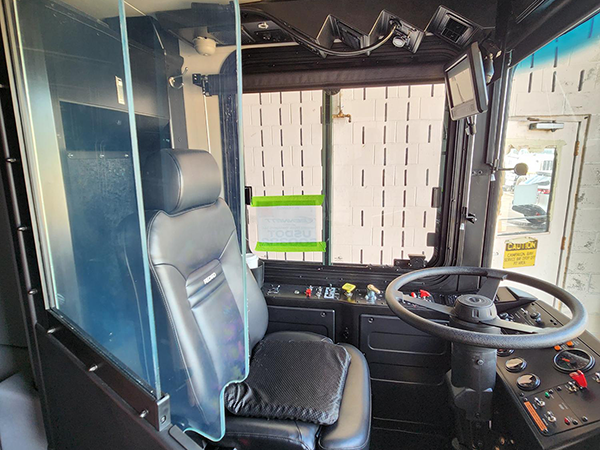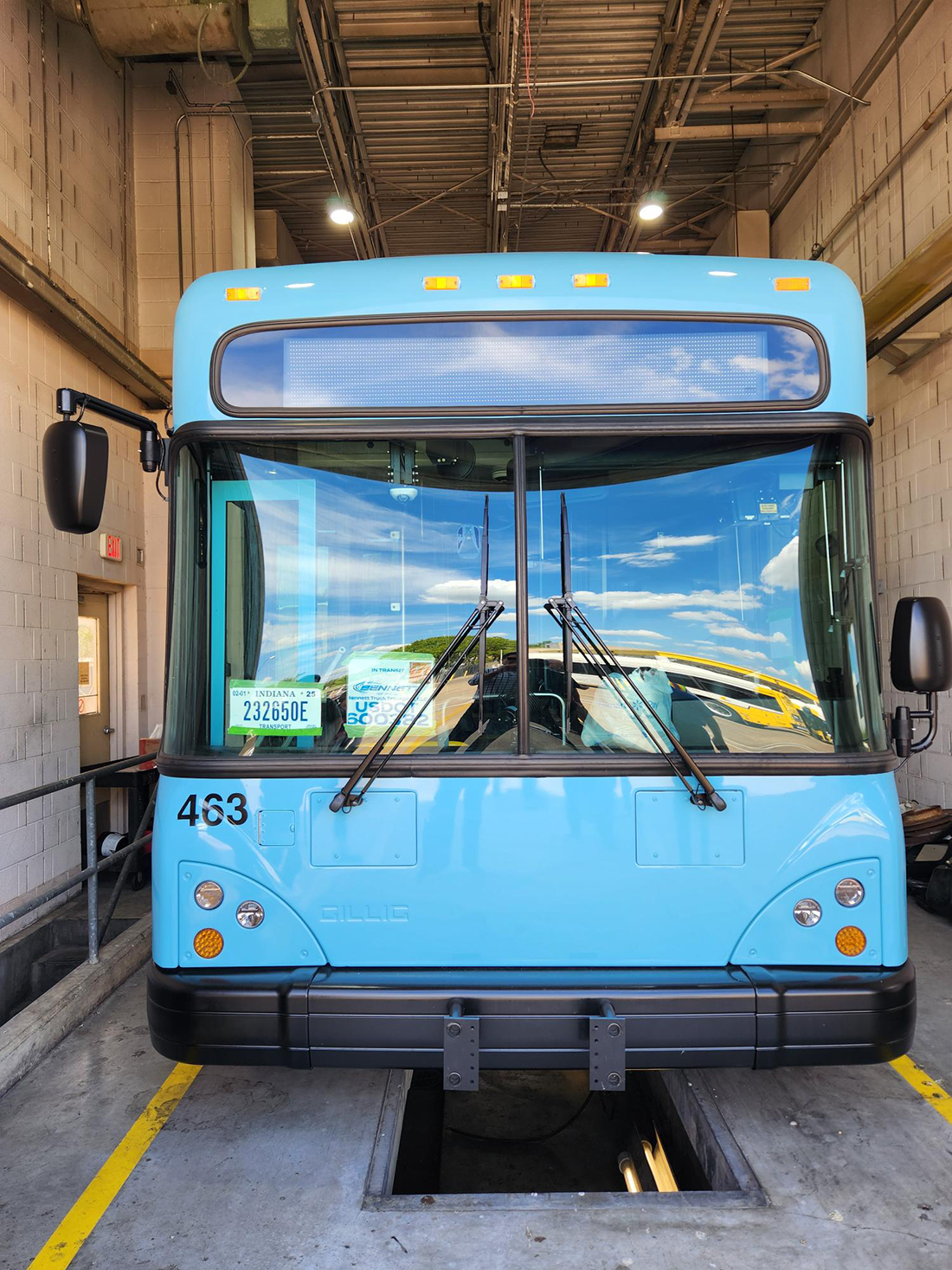- Ask DART
- About
- News
DART Orders 476 New CNG Buses to Upgrade Fleet
 Gillig CNG bus prototype interior
Gillig CNG bus prototype interior
In December, the DART Board of Directors approved the $373 million purchase of 476 new heavy duty compressed natural gas (CNG) buses with the option to purchase 46 more. The initial purchase directly replaces the buses needed to maintain current service, exclusive of express routes. Delaying the purchase of 46 buses allows the agency to assess the future of express bus service.
Alternative procurement approach saves time, money
The agency is purchasing the buses through an innovative Cooperative Purchasing Agreement between DART and the State of Washington’s Department of Enterprise Services (DES). DES developed a FAST Act-compliant transit bus master contract that meets all FTA guidelines and leverages collective buying power by making the contract available to transit agencies within Washington and in other states.
DART has saved time, decreased procurement costs, and reduced risk by purchasing through DES since FTA has already audited and approved the master contract for an unlimited number of buses.
 New fleet will include 30-foot and 40-foot buses
New fleet will include 30-foot and 40-foot buses The agency is ordering 76 30-foot buses and 400 40-foot buses to match the needs of our routes. There are only two bus manufacturers in the United States that build CNG buses and also meet the Federal Transit Administration (FTA) Buy America requirements, to which DART must comply to receive federal funds. DART selected Gillig as the vehicle manufacturer because they offer a 30-foot CNG bus option while their competitor does not.
In fact, DART was awarded a $103 million competitive grant from the FTA’s Low or No Emission Grant Program, which provides funding for the purchase of low-emission and no-emission transit buses.
Purchasing 476 buses in one large order will save the agency $10 million-$15 million and ensures our spot in Gillig’s production schedule over the next few years.
Current fleet reaching its end of useful life
The new bus procurement is part of the DART Transform System Modernization Program and key to achieving the Point B Strategic Plan goal of providing “Quality Service.”
To maintain our bus fleet in a State of Good Repair, DART replaces its vehicles when they reach the end of their useful life. The FTA defines the useful life of a heavy-duty transit bus as 12 to 14 years or 500,000 miles, whichever comes first. DART’s current fleet of 476 local buses will reach or surpass the 500,000-mile life in less than a year, and the 46 Express buses will reach the end of their useful life in 2028.
As the fleet has aged, reliability has decreased and maintenance has increased, creating parts procurement difficulties. In recent years, our bus maintenance team has seen an increase in the most expensive repair categories: engine, HVAC, and transmission. This purchase will alleviate these challenges.
First buses to arrive in late 2025
DART expects to get the “first article inspection” buses by the end of 2025. Gillig will deliver all 476 buses to DART throughout 2026 and 2027. If the agency exercises the option for 46 more buses, those will arrive in 2028.
The delivery of new buses will give DART the extra vehicles it will need to provide bus shuttle service during the 2026 FIFA World Cup, which will take place in June and July of that year.
PHOTOS: DART staff visited Gillig's manufacturing facility and looked at a prototype bus before completing the specifications for the new bus order.
Categories : Leading Mobility - Community
DART Orders 476 New CNG Buses to Upgrade Fleet
 Gillig CNG bus prototype interior
Gillig CNG bus prototype interior
In December, the DART Board of Directors approved the $373 million purchase of 476 new heavy duty compressed natural gas (CNG) buses with the option to purchase 46 more. The initial purchase directly replaces the buses needed to maintain current service, exclusive of express routes. Delaying the purchase of 46 buses allows the agency to assess the future of express bus service.
Alternative procurement approach saves time, money
The agency is purchasing the buses through an innovative Cooperative Purchasing Agreement between DART and the State of Washington’s Department of Enterprise Services (DES). DES developed a FAST Act-compliant transit bus master contract that meets all FTA guidelines and leverages collective buying power by making the contract available to transit agencies within Washington and in other states.
DART has saved time, decreased procurement costs, and reduced risk by purchasing through DES since FTA has already audited and approved the master contract for an unlimited number of buses.
 New fleet will include 30-foot and 40-foot buses
New fleet will include 30-foot and 40-foot buses The agency is ordering 76 30-foot buses and 400 40-foot buses to match the needs of our routes. There are only two bus manufacturers in the United States that build CNG buses and also meet the Federal Transit Administration (FTA) Buy America requirements, to which DART must comply to receive federal funds. DART selected Gillig as the vehicle manufacturer because they offer a 30-foot CNG bus option while their competitor does not.
In fact, DART was awarded a $103 million competitive grant from the FTA’s Low or No Emission Grant Program, which provides funding for the purchase of low-emission and no-emission transit buses.
Purchasing 476 buses in one large order will save the agency $10 million-$15 million and ensures our spot in Gillig’s production schedule over the next few years.
Current fleet reaching its end of useful life
The new bus procurement is part of the DART Transform System Modernization Program and key to achieving the Point B Strategic Plan goal of providing “Quality Service.”
To maintain our bus fleet in a State of Good Repair, DART replaces its vehicles when they reach the end of their useful life. The FTA defines the useful life of a heavy-duty transit bus as 12 to 14 years or 500,000 miles, whichever comes first. DART’s current fleet of 476 local buses will reach or surpass the 500,000-mile life in less than a year, and the 46 Express buses will reach the end of their useful life in 2028.
As the fleet has aged, reliability has decreased and maintenance has increased, creating parts procurement difficulties. In recent years, our bus maintenance team has seen an increase in the most expensive repair categories: engine, HVAC, and transmission. This purchase will alleviate these challenges.
First buses to arrive in late 2025
DART expects to get the “first article inspection” buses by the end of 2025. Gillig will deliver all 476 buses to DART throughout 2026 and 2027. If the agency exercises the option for 46 more buses, those will arrive in 2028.
The delivery of new buses will give DART the extra vehicles it will need to provide bus shuttle service during the 2026 FIFA World Cup, which will take place in June and July of that year.
PHOTOS: DART staff visited Gillig's manufacturing facility and looked at a prototype bus before completing the specifications for the new bus order.
Categories : Leading Mobility - Knowledge
DART Orders 476 New CNG Buses to Upgrade Fleet
 Gillig CNG bus prototype interior
Gillig CNG bus prototype interior
In December, the DART Board of Directors approved the $373 million purchase of 476 new heavy duty compressed natural gas (CNG) buses with the option to purchase 46 more. The initial purchase directly replaces the buses needed to maintain current service, exclusive of express routes. Delaying the purchase of 46 buses allows the agency to assess the future of express bus service.
Alternative procurement approach saves time, money
The agency is purchasing the buses through an innovative Cooperative Purchasing Agreement between DART and the State of Washington’s Department of Enterprise Services (DES). DES developed a FAST Act-compliant transit bus master contract that meets all FTA guidelines and leverages collective buying power by making the contract available to transit agencies within Washington and in other states.
DART has saved time, decreased procurement costs, and reduced risk by purchasing through DES since FTA has already audited and approved the master contract for an unlimited number of buses.
 New fleet will include 30-foot and 40-foot buses
New fleet will include 30-foot and 40-foot buses The agency is ordering 76 30-foot buses and 400 40-foot buses to match the needs of our routes. There are only two bus manufacturers in the United States that build CNG buses and also meet the Federal Transit Administration (FTA) Buy America requirements, to which DART must comply to receive federal funds. DART selected Gillig as the vehicle manufacturer because they offer a 30-foot CNG bus option while their competitor does not.
In fact, DART was awarded a $103 million competitive grant from the FTA’s Low or No Emission Grant Program, which provides funding for the purchase of low-emission and no-emission transit buses.
Purchasing 476 buses in one large order will save the agency $10 million-$15 million and ensures our spot in Gillig’s production schedule over the next few years.
Current fleet reaching its end of useful life
The new bus procurement is part of the DART Transform System Modernization Program and key to achieving the Point B Strategic Plan goal of providing “Quality Service.”
To maintain our bus fleet in a State of Good Repair, DART replaces its vehicles when they reach the end of their useful life. The FTA defines the useful life of a heavy-duty transit bus as 12 to 14 years or 500,000 miles, whichever comes first. DART’s current fleet of 476 local buses will reach or surpass the 500,000-mile life in less than a year, and the 46 Express buses will reach the end of their useful life in 2028.
As the fleet has aged, reliability has decreased and maintenance has increased, creating parts procurement difficulties. In recent years, our bus maintenance team has seen an increase in the most expensive repair categories: engine, HVAC, and transmission. This purchase will alleviate these challenges.
First buses to arrive in late 2025
DART expects to get the “first article inspection” buses by the end of 2025. Gillig will deliver all 476 buses to DART throughout 2026 and 2027. If the agency exercises the option for 46 more buses, those will arrive in 2028.
The delivery of new buses will give DART the extra vehicles it will need to provide bus shuttle service during the 2026 FIFA World Cup, which will take place in June and July of that year.
PHOTOS: DART staff visited Gillig's manufacturing facility and looked at a prototype bus before completing the specifications for the new bus order.
Categories : Leading Mobility - Leading Mobility
- language



 Translate
Translate
Leave a comment